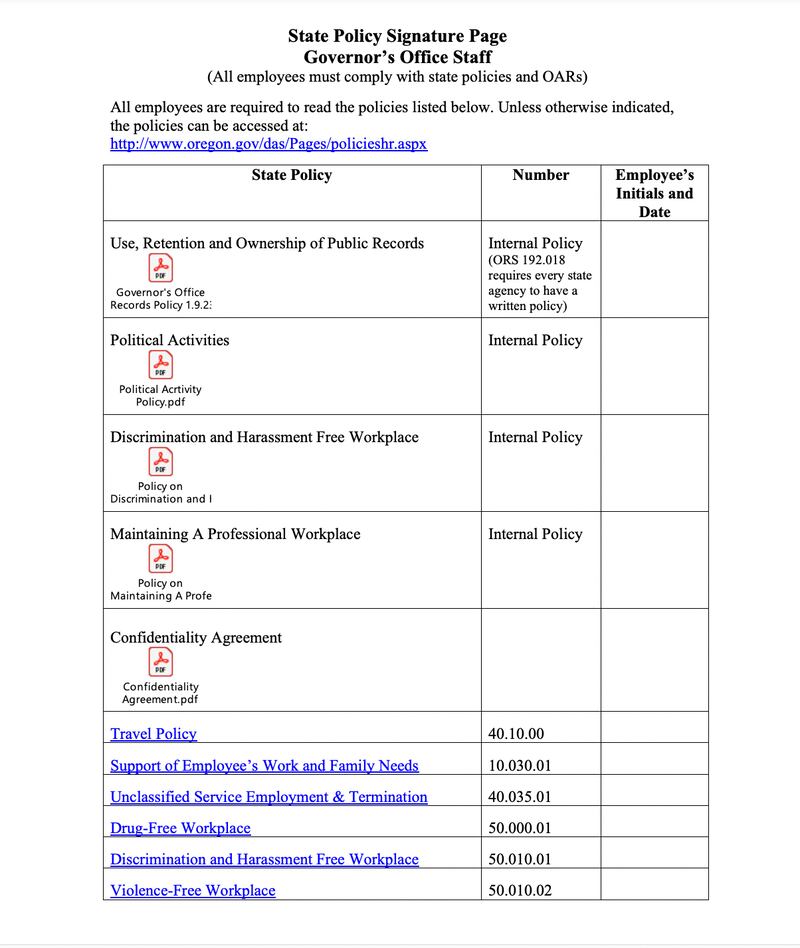When Gov. Tina Kotek’s staff convene for policy meetings about one of the governor’s top three priorities—behavioral health—those staff members have signed documents agreeing to state policies, and another form disclosing any potential or actual conflicts of interest.
All the participants in those meetings have signed the forms—except for one: first lady Aimee Kotek Wilson.
As WW reported earlier, Kotek Wilson took part in interviewing Kotek’s behavioral health care adviser, Juliana Wallace, and held weekly calls with her; met regularly with the consulting firm Deloitte, which has a $21.5 million contract with the Oregon Health Authority to help the state reimagine behavioral health; and spoke and met regularly with Dr. Robin Henderson, the CEO of behavioral health for Providence Health & Services, Oregon.
Governor’s staffers pledge to comply with prohibitions on workplace harassment and mishandling government secrets or public records, and with the conflict-of-interest forms, they disclose any relationship that could be relevant to their jobs and pledge not to take any official actions that could benefit them privately. The disclosure of such conflicts became a pressing issue under Gov. John Kitzhaber a decade ago. His fiancée, first lady Cylvia Hayes, pursued numerous private consulting contracts with groups that had interests before the state—but Hayes resisted signing the relevant disclosure forms.
Related: Cylvia Hayes has two careers. She pursues both out of the governor’s office.
There’s no evidence that Kotek Wilson, who, like Hayes, has taken an active role in the governor’s office, has pursued any financial gain. As Kotek has noted, she is a volunteer. However, after Hayes’ contracts led to Kitzhaber’s resignation in February 2015, the Legislature passed a law clarifying that the governor’s spouse or partner is a public official subject to public records and ethics laws.

Emails show that the issue of having Kotek Wilson sign the disclosure forms and acknowledgements all staff sign came up more than once.
For instance, on Jan. 8, then-chief of staff Andrea Cooper emailed Shelby Campos, Kotek’s director of operations, about getting Kotek Wilson to sign the disclosure and policy documents all governor’s staff signs.
“Can you remind me the elements of our onboarding,” Cooper wrote. “I’m trying to figure out which would be relevant for the FL [first lady]. I am also going to work with [Kotek staff attorneys Richard Lane and Shevaun Gutridge] to have her sign some of our workplace policies (at her request).”
Cooper then asked Campos to make sure the first lady’s scheduler, Yasmin Solorio, prepared hard copies of the documents for Kotek Wilson. “Can you please work with Yasmin so she can have these printed for FL (or in the format she would like them)?” Cooper wrote Jan. 9.
“I will work with Yasmin,” Campos replied. “Yes, the trainings I listed are ones I thought might be beneficial for the FL. She specifically asked about the Preventing Discrimination and Harassment, sexual assault.”
But Elisabeth Shepard, Kotek’s spokeswoman, tells WW that Kotek Wilson never signed any of the workplace polices or filled out a conflict-of-interest form.
“Consistent with last week’s announcement, the governor’s office will await guidance from the Oregon Government Ethics Commission regarding the role of the first lady prior to completing onboarding materials,” Shepard says.
At least one of Kotek’s Wilson’s activities would seem to trigger the completion of a disclosure form. Last year, Kotek Wilson joined the steering committee of an organization called Pathways to Resilience. That organization, according to its website, “provides a national forum to help states and communities advance trauma-responsive policies and programs.”
That pursuit is consistent with the interests of Kotek Wilson, who holds a master’s degree in social work and served as a case manager and mental health counselor prior to her wife’s election as governor in 2022.
But unlike many behavioral health organizations, Pathways to Resilience does not appear to be a nonprofit. Instead, the organization, its website says, is “sponsored by Aurrera Health Group with support from our committees and partners.”
Aurrera Health Group, in turn, is a for-profit national consulting firm based in Sacramento that specializes in advising clients on Medicare and Medicaid programs “at the federal, state, and local levels.” (It is unclear whether Aurrera has any contracts in Oregon. The company didn’t immediately respond to questions.)
Shepard, Kotek’s spokeswoman, says Kotek Wilson’s service on the steering committee (which meets quarterly, according to Kotek Wilson’s calendar) doesn’t require disclosure.
“The governor’s office handles conflicts of interest consistent with Oregon law,” Shepard says. “The first lady was invited along with other first spouses from across the country to participate. It is not evident that this would merit a disclosure as an actual or potential of conflict of interest.”
In a March 15 email to Campos, however, Kotek’s then-special adviser, Abby Tibbs, made the opposite argument, spelling out the simmering conflict between Kotek’s senior staff and the governor over whether there were sufficient guardrails around the first lady’s role. That conflict would later lead to an exodus of three of Koteks’ top four staffers.
“Because the FS’s [first spouse’s] relationship with the state of Oregon is by virtue of their marriage to the Governor there are interesting/complicated legal/ethical/workplace policy implications across a variety of areas even if the FS is a volunteer and I continue to believe that the office has an obligation to not only meet the letter of the law/ethics rules but exceed them and center the spirit of the laws/ethics rules because there are significant issues of public trust and the obligation to the people of Oregon,” Tibbs wrote.
“To that end, the office should take meaningful steps to address the appearance/perception related to a Governor and spouse and staff re conflicts of interest, favoritism, bias, nepotism issues, complicated power dynamics, conflict resolution, retaliation—the things that can really impact GO [governor’s office] staff morale and sense of stability and the confidence in a GO overall.”

